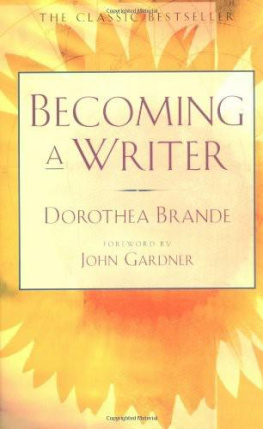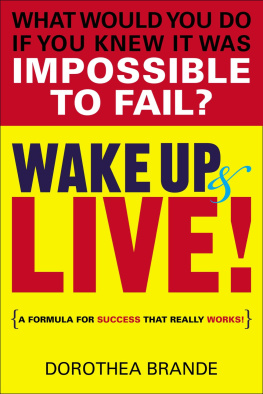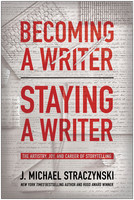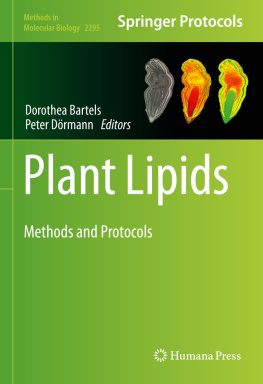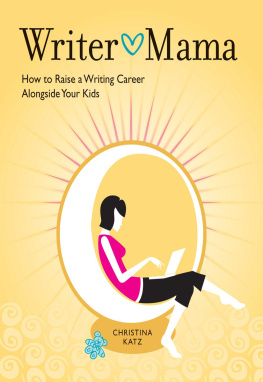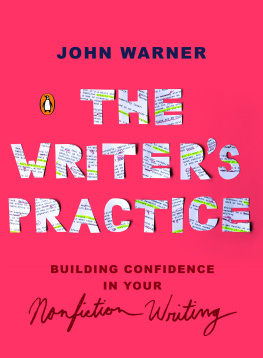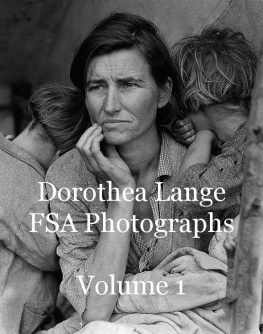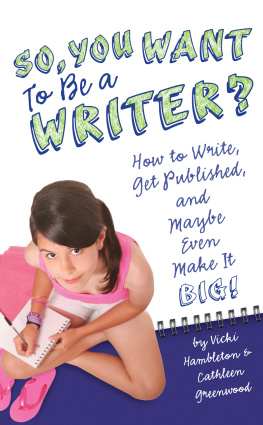
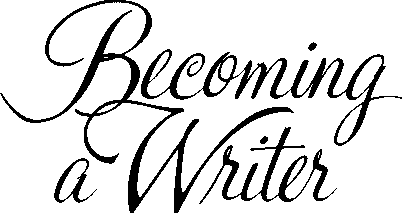

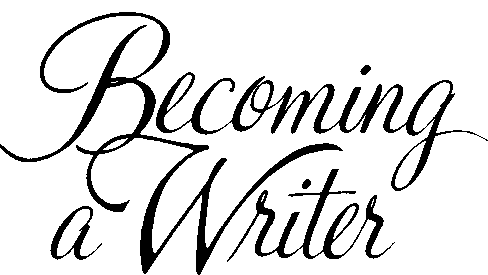
DOROTHEA BRANDE
Foreword by
JOHN GARDNER
A Jeremy P. Tarcher/Putnam Book
published by
G. P. PUTNAM'S SONS
New York
A Jeremy P. Tarcher/Putnam Book
Published by G P Putnam s Sons
Publishers Since 1838
200 Madison Avenue
New York NY 10016
Library of Congress Cataloging in Publication Data Brande, Dorothea Thompson, date
Becoming a writer
Reprint of the 1934 ed. published by Harcourt, Brace, New York
Bibliography p. 177
Includes index
1 FictionTechnique 2 Authorship I Title.
PN3355B7 1981 808 3 80-53146
ISBN 0-87477-164-1
Copyright 1934 by
Harcourt, Brace & Company,
1961 by Gilbert I. Collins and Justin Brande.
Foreword 1981 by J. P. Tarcher Inc.
All rights reserved
Library of Congress Catalog Card No 80- 53146
Design by John Brogna
MANUFACTURED IN THE UNITED STATES OF AMERICA 20 19 18 17 16 15 14 13
For Two Josephines

Contents
Foreword by JOHN GARDNER 11
IN INTRODUCTION 19
1. THE FOUR DIFFICULTIES 25
The Difficulty of Writing at All; The "One-BookAuthor"; The Occasional Writer; The UnevenWriter; The Difficulties Not in TechnicalEquipment.
2. WHAT WRITERS ARE LIKE 35
Cultivating a Writer's Temperament; False andReal Artists; The Two Sides of a Writer; "Dissociation" Not Always Psychopathic; Everyday Examples of Dual Personality; The Slough of Despond.
3. THE ADVANTAGES OF DUPLICITY 45
The Process of Story Formation; The "BornWriter"; Unconscious and Conscious; The TwoPersons of the Writer; The Transparent Barrier;Keep Your Own Counsel; Your "Best Friend andSeverest Critic"; The Right Recreation; Friendsand Books; The Arrogant Intellect; The Two SelvesNot at War; The First Exercise.
4. INTERLUDE: ON TAKING ADVICE 61
Save Your Energy; Imagination Versus Will inChanging Habits; Displacing Old Habits; ADemonstration; The Right Frame of Mind.
5. HARNESSING THE UNCONSCIOUS 69
Wordless Daydreams; Toward Effortless Writing;Double Your "Output."
6. WRITING ON SCHEDULE 75
Engaging to Write; A Debt of Honor; Extending theExercise; Succeed, or Stop Writing.
7. THE FIRST SURVEY 81
Reading Your Work Critically; The Pitfalls of Imitation; Discovering Your Strength; A Footnote forTeachers.
8. THE CRITIC AT WORK ON HIMSELF 89
A Critical Dialogue; Be Specific in Suggestions;Correction After Criticism; The Conditions ofExcellence; Dictating a Daily Regime.
9 .READINGS AS A WRITER 99
Read Twice; Summary Judgment and DetailedAnalysis; The Second Reading; Points of Importance.
10. ON IMITATION 105
Imitating Technical Excellences; How to SpendWords; Counteracting Monotony; Pick Up FreshWords.
11. LEARNING TO SEE AGAIN 111
The Blinders of Habit; Causes of Repetitiousness;Recapturing Innocence of Eye; A Stranger in theStreets; The Rewards of Virtue.
12. THE SOURCE OF ORIGINALITY 119
The Elusive Quality; Originality Not Imitation;The "Surprise Ending"; Honesty, the Source ofOriginality ; Trust Yourself; "Your Anger and MyAnger"; One Story, Many Versions; Your Inalienable Uniqueness; A Questionnaire.
13. THE WRITER'S RECREATION 131
Busmen's Holidays; Wordless Recreation; FindYour Own Stimulus; A Variety of Time-Fillers.
14. THE PRACTICE STORY 137
A Recapitulation; The Contagiousness of Style;Find Your Own Style; The Story in Embryo; ThePreparatory Period; Writing Confidently; AFinished Experiment; Time for Detachment; TheCritical Reading.
15. THE GREAT DISCOVERY 147
The Five-Finger Exercises of Writing; The Root ofGenius; Unconscious, Not Subconscious; TheHigher Imagination; Come to Terms with the Unconscious; The Artistic Coma and the Writer'sMagic.
16. THE THIRD PERSON, GENIUS 155
The Writer Not Dual But Triple; The MysteriousFaculty; Releasing Genius; Rhythm, Monotony,Silence; A Floor to Scrub.
17. THE WRITER'S MAGIC 163
X Is to Mind as Mind to Body; Hold Your MindStill; Practice in Control; The Story Idea as the Object; The Magic in Operation; Inducing the "Artistic Coma"; Valedictory.
IN CONCLUSION: SOME PROSAIC POINTERS 171
Typewriting; Have Two Typewriters; Stationery;At the Typewriter: WRITE!; For Coffee Addicts;Coffee Versus Mat; Reading; Book and MagazineBuying.
BIBLIOGRAPHY
INDEX

Foreword
It's an astonishing thing that Dorothea Brande's Becoming a Writer should ever have fallen out of print, and a lucky thing it is now back in the light where it belongs. The root problems of the writer, whether the writer is young or old, just starting out or much published, are no different today than in 1934, when Becoming a Writer was first published. They do not have to do with "the techniques of writing fiction" the subject matter of all creative writing courses and insofar as the root problems never get mentioned, almost all creative writing courses are for most people most of the time failures. The root problems of the writer are personality problems: He or she cannot get started, or starts a story well then gets lost or loses heart, or writes very well some of the time, badly the rest of the time, or writes brilliantly but
12 Becoming a Writer
after one superb story or novel cannot write again, or writes brilliantly while the creative writing course lasts but after it is over can no longer write. The root problems, in other words, are problems of confidence, self-respect, freedom: The writer's demon is imprisoned by the various ghosts in the unconscious.
Ms. Brande points out with the delightful wit we find everywhere in her book that for the writer suffering from uncertainty and self-doubt, writing teachers and books about writing, not to mention symposia of famous authors, do to the young (or old) struggling writer just about the worst thing they could do: "In the opening lecture, within the first few pages of his book, within a sentence or two of his authors' symposium, he will be told rather shortly that 'genius cannot be taught'; and there goes his hope glimmering. For whether he knows it or not, he is in search of the very thing that is denied him in that dismissive sentence." Ms. Brande's purpose in Becoming aWriter is to make available to the writer the very thing usually denied.
She is right that genius can be taught (once the secret emptiness of that phrase is understood) because in fact genius is as common as old shoes.
Next page
